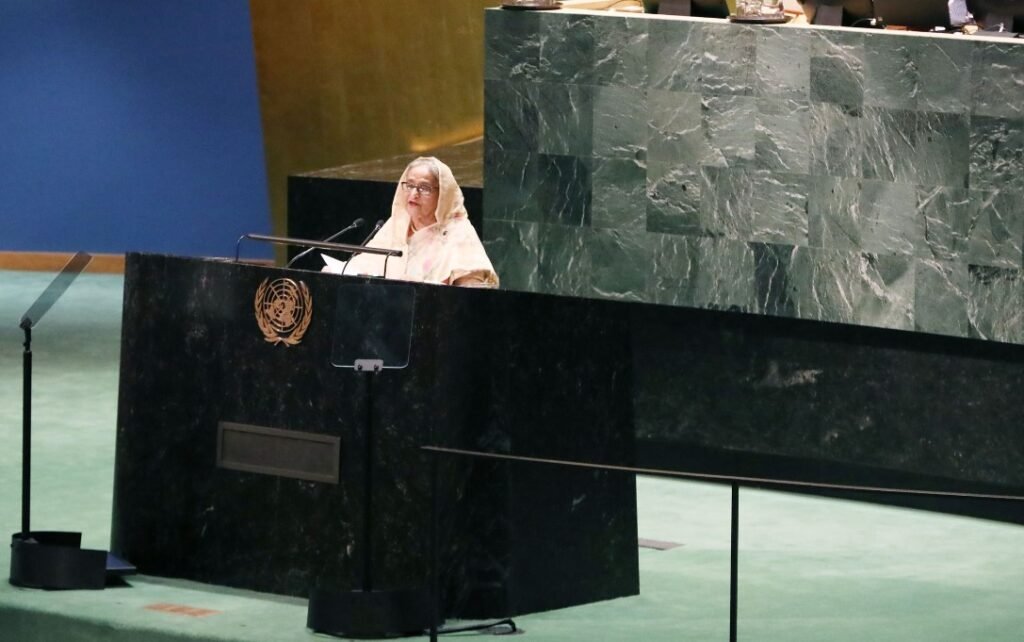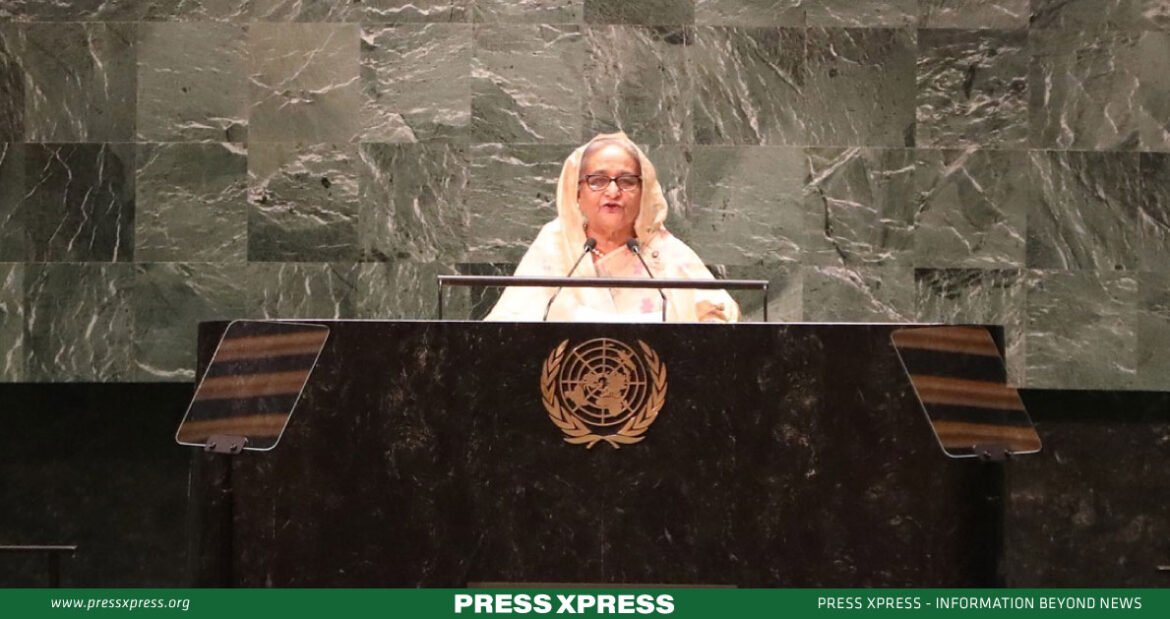In her address at the UN General Assembly on Friday, September 22, 2023, Prime Minister Sheikh Hasina emphatically reaffirmed Bangladesh’s unwavering commitment to promoting democracy and the rule of law. The PM affirmed to maintain these in strict accordance with the country’s constitution.
During her speech at the 78th session of the United Nations General Assembly, the Prime Minister passionately declared, “In this session today, I would like to unequivocally reiterate that Bangladesh will continue to promote democracy, rule of law, and freedom of expression in line with Bangladesh’s constitution.”
You can also read: Key Takeaways from Sheikh Hasina’s UNGA Addresses: 1996 to 2023
The Assembly was convened at the UN headquarters in New York. This marked the 17th occasion that the premier had graced the UN general session with her presence. True to tradition, she delivered her address in Bangla, following in the footsteps of the Father of the Nation, Bangabandhu Sheikh Mujibur Rahman. In 1974, Bangabandhu Sheikh Mujibur Rahman had first addressed the UNGA in the same language.
Human rights, equality, and justice above all
Prime Minister Hasina underscored the importance of safeguarding human rights without allowing them to be exploited for political ends, especially when it comes to exerting undue pressure on developing nations. She astutely pointed out that this year commemorates the 75th anniversary of the adoption of the Universal Declaration of Human Rights (UDHR). On this significant milestone, she eloquently remarked, “On this auspicious occasion, we must reinforce our commitment to our common humanity and take collective action to advance equality, justice, and freedom for all human beings. At the same time, it is imperative to ensure that human rights are not politicized to exert pressure on developing countries.”
In this climactic moment of her speech, Prime Minister Sheikh Hasina fervently called upon the global community to unite in upholding the principles of human rights, equality, and justice for the betterment of all.
Prime Minister Sheikh Hasina emphasized that Bangladesh’s constitution stands as a steadfast guarantor of fundamental human rights for all its citizens. She articulated, “Over the past decade, we have implemented substantial reforms within our legal framework to ensure that equal legal protection and access to justice are accessible to every individual. As a responsible state, Bangladesh is wholly dedicated to the protection and advancement of human rights.”
In a pivotal moment, the Prime Minister revealed Bangladesh’s active role as an elected member of the Human Rights Council, where the nation collaborates closely with fellow member states in the collective endeavor to safeguard the rights of people across the globe. This announcement added a resounding climax to her address, underscoring Bangladesh’s commitment to the universal cause of human rights and global harmony.
A call for unity and a just economic order
The PM stated, “For a secure, peaceful, prosperous, and sustainable future for all, we must embark on a united effort to overcome the distinct challenges that confront us. To achieve this, we must embrace unity, collaboration, and multilateralism, in accordance with the principles of the United Nations and the 2030 Agenda.”
“In these turbulent times, your call for rebuilding trust and revitalization is resonant and pertinent,” she declared. Later, she invoked a special quote from Bangladesh’s founding father, Bangabandhu Sheikh Mujibur Rahman, who in his 1974 speech at the UNGA had stated, “The recent economic crisis witnessed worldwide has created an opportunity for us to expedite a just international economic order… To overcome the present crisis, a concerted effort for unity and brotherhood among us is essential.”
The Prime Minister emphasized her government’s commitment to sustainable development, stating, “Since the formation of our government in 2009, we have extensively invested in the welfare of our people, establishing an inclusive and modern democracy for the betterment of our nation. Following our National father’s showed path, through pragmatic policies, forward-looking thinking, and investment, we have transformed Bangladesh from a low-income to a middle-income country. We have reduced extreme poverty from 41.5% in 2006 to 18.7% in 2022 and brought down the rate of extreme poverty from 25.1% to 5.6%.”
She also highlighted Bangladesh’s remarkable progress in achieving the Sustainable Development Goals (SDGs), stating, “Our success in attaining the Millennium Development Goals (MDGs) and obtaining the status of a Developing Country with Graduation (DCG) demonstrates our commitment to sustainable development. However, like other countries in the world, Bangladesh also faces significant challenges in this regard. The coronavirus pandemic, various humanitarian crises, and natural disasters have made these challenges more complex.”

Strategic measures for economic stability and resilience
In response to these challenges, Prime Minister Hasina outlined her government’s efforts to ensure economic stability and resilience. She said, “We have made some tough economic and policy decisions to ensure fiscal discipline and currency stability during this period of crisis and to control inflation. Furthermore, we have increased investments in social safety nets and provided targeted support to agriculture, small and medium-sized industries, and other vulnerable sectors. We have expanded the coverage of social safety nets, reaching nearly 4 billion people directly and indirectly.”
She also noted the expansion of social protection programs to benefit vulnerable groups, including women, widows, the elderly, and disabled individuals, as well as the broader population. In the current fiscal year, approximately 12 billion US dollars have been allocated to the social protection sector.
Sheikh Hasina spoke about taking steps to end discrimination against women, saying, “In achieving SDGs, we have considered the end of discrimination against women with utmost importance. Ensuring women’s empowerment, gender equality, and fulfilling their aspirations within the stipulated time are Bangladesh’s commitments. We have placed special emphasis on comprehensive education, including women’s education. Since 2010, we have been distributing free textbooks to students from primary to secondary education levels. Scholarships, stipends, and one-time grants are being provided to approximately 253 million students from primary to higher education levels, with more than half of them being women.”
“In our national budget, we have allocated 30% for women’s social and economic empowerment. In the political arena, we have ensured women’s representation at all levels of government, from the top to the grassroots. We aim to achieve 50% women’s participation in every sector by the year 2030. To realize this goal, we are actively working to combat child marriage, violence against women, human trafficking, and other crimes against women through appropriate legislation and their effective enforcement. We support all international initiatives for women’s progress through the United Nations General Assembly’s ‘Platform for Women Leaders.'”
Green initiatives for a climate-resilient Bangladesh
“While our contribution to global carbon emissions is less than 0.47%, Bangladesh is among the countries most affected by climate change. The adverse effects of climate change pose a severe threat to our present and future generations, as well as our economic prosperity. To address this, we need urgent, bold, and ambitious actions.”
“Bangladesh is committed to environmental conservation, biodiversity protection, and climate-resilient sustainable development. We are embracing a national strategy for achieving a low-carbon economy called ‘Mujib Climate Prosperity Plan.’ We are gradually transforming from a vulnerable climate-affected nation to a climate-resilient one. Over 6 million people in Bangladesh are using solar home systems, and we are working towards more sustainable energy solutions. We hope to derive 40% of our energy from renewable sources by the year 2041.”
“We call upon major carbon-emitting nations to adopt and implement ambitious NDCs (Nationally Determined Contributions). Meeting the financing pledge of $100 billion is essential for the development needs of climate-vulnerable countries. We need to consider the development aspirations of climate-vulnerable nations. We urgently seek the implementation of the Loss and Damage mechanism related to climate change, considering sea-level rise, salinity intrusion, river erosion, cyclones, and other factors affecting climate refugees on coastal areas.”
Sheikh Hasina concluded, “In the pursuit of climate resilience and adaptation, we are building embankments, cyclone shelters, green belts, and promoting afforestation along the coastal areas. In Cox’s Bazar, we are implementing the world’s largest housing project for climate-affected people, constructing 139 multi-story buildings with all amenities to accommodate 4,409 vulnerable families. Our transformative initiative ‘Ashrayan’ has provided homes to nearly 5 million people from landless and homeless families at no cost.”
“We are implementing ‘Bangladesh Delta Plan 2100’ to ensure a safe, climate-resilient, and prosperous delta through integrated delta management. With the principles of the Paris Agreement in mind, Bangladesh is adopting skills in low-carbon technologies through various green initiatives.”
“In our efforts to combat climate change and adaptation, we hope to transform from a vulnerable nation to a climate-resilient one. Bangladesh has over 6 million people using solar home systems, and we are working towards achieving 40% of our energy from renewable sources by 2041.”
“We call upon major carbon-emitting countries to adopt and implement ambitious NDCs (Nationally Determined Contributions) and fulfill the $100 billion financing pledge for climate-vulnerable countries. The development needs of climate-vulnerable nations must be taken into consideration. We urgently request the implementation of the Loss and Damage mechanism related to climate change, considering sea-level rise, salinity intrusion, river erosion, cyclones, and other factors affecting climate refugees in coastal areas.”


